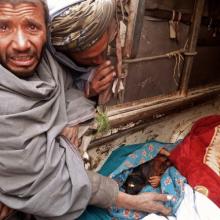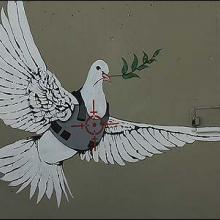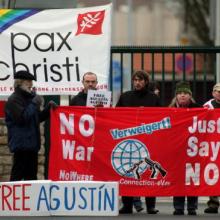War
In an opinion piece for Bloomberg View, Michael Kinsley writes:
As demand starts to build on President Barack Obama to “do something” about the deteriorating situation in Syria, let’s review where the U.S. and its citizens stand on the general question of using military force abroad. On this issue, Americans are divided in strange ways. It’s no longer a matter of hawks and doves. There are liberal hawks and conservative doves as well as conservative hawks and liberal doves.
Read his full piece here
This coming fiscal year, the United States is set to spend more than $640 billion dollars on the Pentagon and war, accounting for more than 60 percent of federal domestic spending. In excess of $85 billion of that will be spent on the war in Afghanistan alone.
This unfathomable amount of money was approved by the House of Representatives in the National Defense Authorization Act. These funds will serve to bring suffering and pain to innocent people, further militarize the world and undermine peace and stability for generations to come—all on the backs of those who struggle at home.
In the backdrop of such spending, we’re told that we’re in a financial crisis. Elected officials tell us it is time to make tough choices. There isn’t enough money for programs like “Meals on Wheels” and for ensuring everyone has access to adequate healthcare. Our schools and bridges must wait to be repaired. New roads and schools must remain unconstructed.
Yet some of us know better.
 CLICK HERE TO HELP PROTECT POVERTY PROGRAMS FROM FEDERAL BUDGET CUTS (and get an "End Poverty" or "Wage Peace" bumper sticker.)
CLICK HERE TO HELP PROTECT POVERTY PROGRAMS FROM FEDERAL BUDGET CUTS (and get an "End Poverty" or "Wage Peace" bumper sticker.)
Gen. John Allen, the U.S./NATO commander in Afghanistan, is reorienting the military mission in Afghanistan. As U.S. troops leave, Afghan troops must take the lead.
Faced with an order from President Obama to withdraw 23,000 troops by the end of the summer, and the prospect of further reductions next year, Allen is hastily transforming the U.S. military mission in Afghanistan. Instead of trying to continue large U.S. counterinsurgency operations for as long as he can, he is accelerating a handover of responsibility to Afghan security forces. He plans to order American and NATO troops to push Afghans into the lead across much of the country this summer, even in insurgent-ridden places that had not been candidates for an early transfer.
From The Associated Press' Anne Gearan:
"Support for the war in Afghanistan has reached a new low, with only 27 percent of Americans saying they back the effort and about half of those who oppose the war saying the continued presence of American troops in Afghanistan is doing more harm than good, according to an AP-GfK poll.
In results released Wednesday, 66 percent opposed the war, with 40 percent saying they were "strongly" opposed. A year ago, 37 percent favored the war, and in the spring of 2010, support was at 46 percent. Eight percent strongly supported the war in the new poll."
How many more times do we have to read a story like this one?
The American military claimed responsibility and expressed regret for an airstrike that mistakenly killed six members of a family in southwestern Afghanistan, Afghan and American military officials confirmed Monday. The attack, which took place Friday night, was first revealed by the governor of Helmand Province, Muhammad Gulab Mangal, on Monday.
If it is the U.S. intention to win over the Afghan people, this is exactly how not to do it.
A year ago today, I read a Tweet that President Barack Obama was interrupting primetime TV to address the nation regarding terrorism. My heart dropped. All I could think about was that terrifying feeling 10 years earlier while watching 9-11 coverage. It only took about half an hour of speculation on 24-hour news stations, Twitter, Facebook, etc., before reports came out that Obama would be announcing the death of public enemy No. 1, Osama bin Laden.
My first reaction was relief. The second, I confess, was one of pride—shared by the nation at the time and many still. But at some point in the aftermath, I read a friend’s post that convicted me and brought me back to reality.
President Barack Obama landed in Afghanistan this afternoon on an unannounced trip. He will meet with Afghan President Hamid Karzai and sign a strategic partnership agreement pledging U.S. support for Afghanistan for a decade after 2014 when the U.S. combat role is set to end.
Obama will then deliver a live, televised speech to the American people on live television at 7:30 this evening (Tuesday). He is expected to give an update on Afghan withdrawal plans.
Update—5 p.m.
Presidents Obama and Karzai have signed in Kabul a strategic partnership agreement between the two countries.
The Associated Press reports:
“The partnership spells out the U.S. relationship with Afghanistan beyond 2014, covering security, economics and governance. The deal is limited in scope and essentially gives both sides political cover: Afghanistan is guaranteed its sovereignty and promised it won't be abandoned, while the U.S. gets to end its combat mission in the long and unpopular war but keep a foothold in the country. The deal does not commit the United States to any specific troop presence or spending. But it does allow the U.S. to potentially keep troops in Afghanistan after the war ends…”
“At a signing ceremony in Kabul with Afghan President Karzai, Obama said the agreement paves the way for 'a future of peace’ while allowing the United States to ‘wind down this war.’ Karzai said his countrymen ‘will never forget’ the help of U.S. forces over the past decade.”
Peter Bergen, a director of the New America Foundation, writes: “The president who won the Nobel Peace Prize less than nine months after his inauguration has turned out to be one of the most militarily aggressive American leaders in decades.”
And he adds up the evidence of the past four years:
"Mr. Obama decimated Al Qaeda’s leadership. He overthrew the Libyan dictator. He ramped up drone attacks in Pakistan, waged effective covert wars in Yemen and Somalia and authorized a threefold increase in the number of American troops in Afghanistan. He became the first president to authorize the assassination of a United States citizen, Anwar al-Awlaki, who was born in New Mexico and played an operational role in Al Qaeda, and was killed in an American drone strike in Yemen. And, of course, Mr. Obama ordered and oversaw the Navy SEAL raid that killed Osama bin Laden."
These actions, allegedly against the “threat of terrorism,” are reminiscent of the so-called Reagan Doctrine against the “threat of communism” in the early-to-mid 1980s. We’re still paying the price for the use of covert operations to attack insurgents, while supporting repressive and corrupt governments in that era. The Mujaheddin who were armed and trained to fight the Soviet occupation of Afghanistan are now the Taliban and Al Qaeda fighting the U.S. occupation. The price of the last four years is yet to be seen, but history suggests it will be substantial.
The U.S. and European allies in the so-called “Friends of Syria” took another step down the slope toward military intervention this week. In a Paris conference, the talk was tough, especially from Secretary of State Hillary Clinton.
The Washington Post began its story, “The United States, France and 13 other nations demanded Thursday that Syria immediately cease military operations against rebel forces and allow unfettered deployment of U.N. observers, suggesting that use of force will be considered if Damascus fails to comply.”
It continued by quoting Sec. Clinton making the suggestion more concrete: “I think we have to do more to take stronger action against the Assad regime,” she said. “We need to start moving very urgently in the Security Council for a Chapter 7 sanctions resolution, including travel, financial sanctions, an arms embargo and the pressure that that will give us on the regime to push for compliance with Kofi Annan’s six-point plan.”
The New York Times added that “Mrs. Clinton said the United States was increasing its nonmilitary aid. Other countries may be doing more with military training. But ‘we are expanding our communications, logistics and other support for the Syrian opposition,’ she said.”
One might think that after Iraq, Afghanistan and Libya, we have learned that military intervention usually does not solve the problems it purports to, and in fact, many times exacerbates them. Yet with expanded drone strikes in Yemen, the continuing threat of attacks on Iran, and the growing war talk on Syria, we seem to have learned nothing. Stay tuned for the next war.
Duane Shank is Senior Policy Advisor at Sojourners. You can follow him on Twitter @DShankDC.
Today is the anniversary of the Warsaw Ghetto uprising in 1943, and the day designated as Holocaust Remembrance Day. Ari Shavit, senior correspondent and editorial board member of Haaretz newspaper has some important reflections on how that remembrance is used and misused.
We are being torn between those who mention Auschwitz so that Israel will be deemed innocent in every situation, and those who distance themselves from Auschwitz so that Israel will always be guilty. As a nation, we have lost the ability to experience the Holocaust both as a universal event with humanitarian significance and as a unique event with Jewish and Israeli significance. …
It is our duty not to speak harshly and not to exploit it. The Holocaust was a terrifying event of insanity. The true imperative to be derived from the Holocaust is the imperative of sanity. Not to be enslaved to the past but also not to be alienated from it. To observe death, and to remember death - and to choose life.
In a world that seems dominated by death – from Afghanistan, Iraq and Syria; to South Sudan and the Congo; this day should allow us to reflect on the 6 million Jews who died in Europe and to redouble our efforts to work for life for the millions dying or threatened with death today.
Duane Shank is Senior Policy Advisor at Sojourners. You can follow him on Twitter @DShankDC.
One year after Syrian President Bashar al-Assad’s April 2011 crack down on civilian protests against his regime’s torture of students who had put up anti-government graffiti, the U.S. and the world are still figuring out what to do about it.
On March 21 the United Nations Security Council announced that it backed a six-point peace plan put forward by former UN General Secretary Kofi Annan. By March 27, Annan reported that al-Assad had accepted the cease-fire plan that will take effect April 10. But even as al-Assad met with Annan, reports of escalated crackdowns surfaced. Then on April 3 reports of military escalation in four major urban centers dashed hopes that al-Assad’s April 10 military withdrawal will actually take place.
And so the world waits for Tuesday. Then we will know what legitimate courses of action may come next. If al-Assad abides by the peace plan, then the world can exhale and allow peace to have its process. If not, then multiple questions step to the fore.
Another 16 lives were added to the body count of the war in Afghanistan over the weekend.
All of them civilians, nine were children, including one three year old girl.
The alleged perpetrator, a U.S. Sergeant, killed many of the victims with a single shot to the head before he piled together eleven of the bodies and set them on fire.
There is no way to measure the loss for the families of the victims, no way to understand the harm done to peace process in the country and no way to calculate the additional deaths of Americans, Afghans and others from across the world this will likely cause.
There is no way to know the full cost of war.
While compiling the morning “Daily Digest,” I often recall the advice of Karl Barth, who is said to have told young theologians “to take your Bible and take your newspaper, and read both. But interpret newspapers from your Bible.”
There are many mornings that Jesus’ advice comes to mind after reading the news. When you hear of wars and rumors of wars, do not be alarmed; this must take place, but the end is still to come (Mark 13:7). While I am not an end times apocalyptic, there are days that Jesus’ prophecy seems all too real.

Prince of Peace Abbey, Oceanside, Calif. Photo by Randy OHC/Wylio http://bit.ly/wFY3hy
As a person who (loosely) identifies with the evangelical tradition, allow me to make a clear, unambiguous, declaration: GOD IS PRO-PEACE!
You may be thinking, “Just how exactly does a guy who claims to believe in the inspiration of Scripture arrive at the conclusion that God is pro-peace? Has this guy even read the Bible? Maybe he’s one of those amnesia-type Christians, the ones who read through the Bible every year as part of their daily devotions, and every time they get to the slavery and genocide passages, their mind goes ______________.
Maybe it wasn't those exact words, but whatever you were thinking, believe me, I get it!
U.S. Army Lieutenant Colonel Daniel Davis, during his second tour in Afghanistan last year, traveled throughout the country, meeting with and interviewing American troops. He came away convinced that military leaders had not told the truth, and the war was a disaster.

It seems like every day we hear from another politician saying that “we are ready to attack Iran if necessary," or from another pundit full of hot air telling us why we should invade Iran right now.
The presumptive Republican nominee, Mitt Romney, has said that he would support “something of a surgical-strike nature, to something of a ‘decapitate the regime’ nature to eliminate the military threat of Iran altogether.” President Obama has said: “Every option is on the table.” All of these conversations typically go along the lines of emphasizing how Iran poses a serious and immediate threat to the United States.
As was the case in the conversations leading up to the 2003 Iraq war, there is much heat, and not a whole lot of light.
Growing up in Kuwait, Asif Balbale thought he wanted to become a chemical engineer. He never imagined enlisting in the U.S. Navy, much less becoming an imam.
Balbale got his engineering degree after immigrating to the U.S. at age 21. With jobs hard to come by, he tried to enlist in the Army, but didn't weigh enough. Instead, he met the Navy's minimum requirements.
He was sworn in as a U.S. citizen in 2005 while deployed aboard the USS Boxer. Intending to apply for an officer program, Balbale, 31, mistakenly emailed a recruiter for the chaplain corps.
"God, I think, had better plans for me," Balbale said, looking back.
And so it is for a number of military chaplains who, by twists of fate or perhaps divine Providence, found their calling to become chaplains while on active duty.
Today I was catching up on emails and came across two messages that deeply affected me, maybe because I read them back-to-back.
The first one is from a friend who helped release the “Collateral Murder” video via Wikileaks, showing US troops shooting some unarmed folks in Baghdad, including two children sitting in a van as their family stopped to pick up the wounded and dead. It is one of the most disturbing and heartbreaking videos I’ve ever seen. Feel free not to watch it.
NOTE: If you do watch the video inside the blog, please know that it is contains vivid images of war. It was released here:
The other email message I read was just the opposite. It was about life.
During the first-ever all-virtual interview conducted by Americans via Google+'s "hangout" group video chat feature, a young, homeless veteran in Boston asked President Obama why the United States still gives money to countries such as Pakistan, that are known to fund terrorism — especially when there are so many veterans living on the streets after returning from the war. The session was broadcast live via YouTube.
Watch the video of their conversation inside the blog...
One of the U.S. Constitution's difficult balances is found in the freedom of religion clause of the First Amendment:
“Congress shall make no law respecting an establishment of religion, or prohibiting the free exercise thereof …”
What happens when those two values conflict?
That is the issue with the controversy over whether religiously-affiliated organizations should be required to offer free coverage for contraception in health insurance plans made available to employees. Those opposed — most notably Catholic organizations — claim that this requirement would violate their freedom of conscience. Those who support it claim that exempting religiously-affiliated organizations would establish a religion over the rights of individuals.








